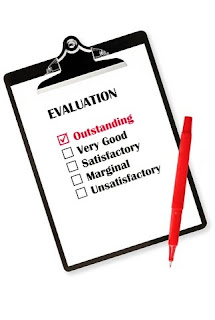 For far too long we have assumed that 'Formative Assessment' and 'Feedback' are one and the same thing. Students say "I don't want to know about the feedback, just tell me the grade I've got." Teachers, too, tend to give feedback towards the end of a project and invariably only once.
For far too long we have assumed that 'Formative Assessment' and 'Feedback' are one and the same thing. Students say "I don't want to know about the feedback, just tell me the grade I've got." Teachers, too, tend to give feedback towards the end of a project and invariably only once.It is time that both teachers and their students began to learn a few home-truths about Formative Assessment.
I always enjoy Sarah Stewart's blog - she is a hard-working and adventurous professional and her recent blog on Formative Assessment set me thinking. One quote in particular stands out:
"As a teacher, in the past the only time I heard from students about the feedback I gave them was when they wanted me to increase their grades. Very rarely have I heard from students who have wanted to discuss my feedback so they can learn how to improve their 'performance'."
I see Formative Assessment very differently. Firstly, as a teacher I see formative assessment
 as being the pre-emptive strike that ensures that we are both understanding each other. This, I hope will ensure that the student does not waste valuable time going off in the wrong direction. Secondly, I am concerned that the student should feel that I'm really interested in what he/she is doing - one visit hardly demonstrates interest. Apart from anything else, as we increasingly encourage independent investigation and lateral thinking, there is a fair chance that I may need to 'mug-up' on some areas into which I think that the student might venture. And, leading on from this, feedback is seriously NOT uni-directional. - Feedback from the student may suggest that the teacher needs to modify his/her presentation techniques or coverage of the syllabus.
as being the pre-emptive strike that ensures that we are both understanding each other. This, I hope will ensure that the student does not waste valuable time going off in the wrong direction. Secondly, I am concerned that the student should feel that I'm really interested in what he/she is doing - one visit hardly demonstrates interest. Apart from anything else, as we increasingly encourage independent investigation and lateral thinking, there is a fair chance that I may need to 'mug-up' on some areas into which I think that the student might venture. And, leading on from this, feedback is seriously NOT uni-directional. - Feedback from the student may suggest that the teacher needs to modify his/her presentation techniques or coverage of the syllabus.Sarah referred to the University of Technology, Sydney and some very useful links to the whole discussion on assessment. For me one paper in particular made very pleasing reading, 'Formative assessment and self-regulated learning: A model and seven principles of good feedback practice.' A bit of a mouthful, but well worth downloading. I quote the seven principles:
Good feedback practice:
1. helps clarify what good performance is (goals, criteria, expected standards);
2. facilitates the development of self-assessment (reflection) in learning;
3. delivers high quality information to students about their learning;
4. encourages teacher and peer dialogue around learning;
5. encourages positive motivational beliefs and self-esteem;
6. provides opportunities to close the gap between current and desired performance;
7. provides information to teachers that can be used to help shape the teaching.
I've referred elsewhere to W.J. Popham's book, 'Transformative Assessment' but would again commend it here for its very clear message to teachers about how feedback can influence the work of both students AND teachers.
The argument for e-Portfolios
From the above propositions I can almost hear teachers saying, "But when have I got the time to arrange all these interviews, MULTIPLE interviews, with all my students????" And this is where the e-Portfolio enters in as the perfect solution. Teachers can 'chat' privately with their students as and when they choose, synchronous or asynchronous. Staff can access the students' work in progress and even chip in with a suggestion without the student asking. Perhaps, more importantly, the e-Portfolio allows staff to look, as it were, 'behind the scenes' and better understand where the student is coming from, in all senses of the word. And eFolio, being a 'rich media tool' is an excellent solution to the whole problem.




3 comments:
Great post, Ray. I guess I need to differentiate more between formative and summative feedback. I guess I was thinking of summative feedback when I wrote my blog post but I do recognise that I need to turn things around...rely more heavily on formative rather than summative feedback. I agree with you about ePortfolios - they allow us to take a more staged approach to assessment, which I think supports learning.
Hi Ray. Thanks for giving me a lot to think about. Our school (K-12) is currently in the process of planning an ePortfolio solution. I'm curious to if you have a platform preference when it comes to implementation? We are looking for exemplars that we can then use to help shape our own solutions. Cheers.
Hi, Clint,
Obviously my preferred system is eFolio but as it is purely an html/xhtml application which we host externally it is truly platform independent.
I read your item today in 'Learning on the Job' - which I thoroughly endorse. It is only after some 45 years as a teacher (and going up through the ranks) that I felt able to develop a system which is designed primarily for both teaching and learning.
By the way, I would add to your list of 'facets' (http://blog.misterhamada.com/) several important points for a 'proper' e-Portfolio rather than a glorified blog. But see my response on yours.
Best Wishes, and please come back to me if you wish.
Post a Comment